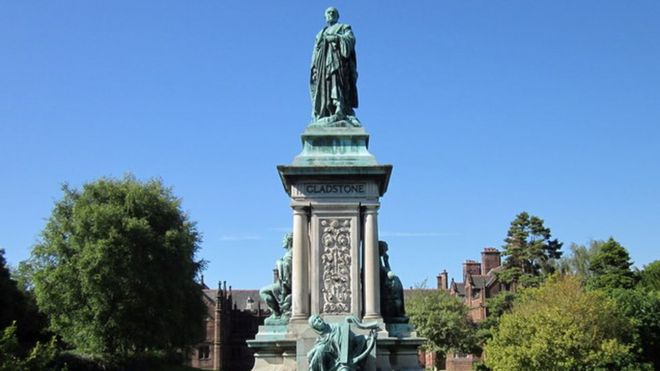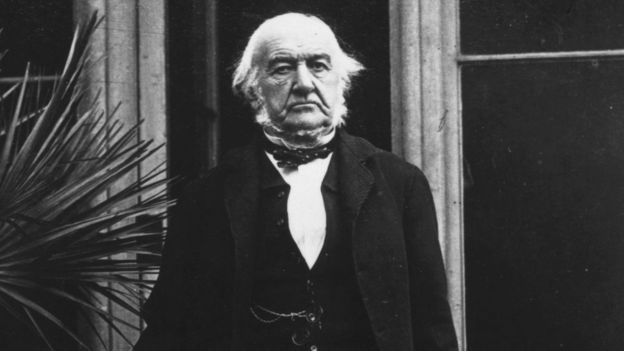Image copyright GEOGRAPH/JEFF BUCK Image caption The memorial stands in the grounds of Gladstone's Library in Hawarden The great-great-...
 GEOGRAPH/JEFF BUCK
GEOGRAPH/JEFF BUCK
The great-great-grandson of William Gladstone has said he will not oppose removing a statue of the statesman from the family's home village.
Gladstone, who died in 1898, called for compensation for slave owners, such as his father, after slavery was outlawed.
However, he would later call slavery the "foulest crime" in UK history.
A monument stands in the grounds of the Gladstone Library near the ancestral home of Hawarden Castle, Flintshire, where Charlie Gladstone lives today.
Mr Gladstone said he would not stand in the way of a "democratic" decision to remove the statue.
Campaigners have included the statue on a list of monuments they want taken down due to links with slavery and the University of Liverpool is to remove his name from a halls of residence.
A statue to slave trader Edward Colston was torn down by Black Lives Matter demonstrators in Bristol on Sunday.
In a joint statement, Mr Gladstone and the warden of the Gladstone Library said they did not think the statesman himself - "who worked tirelessly on behalf of democratic change" - would oppose the removal of the statue.
- Crowds gather in Wales for George Floyd protests
- Changing face of Wales: Is racial prejudice alive?
- 'Why Colston's statue had to come down'
"This is why we believe that what matters is how we live today, our values, our democratic process and political involvement," the statement continued.
"Gladstone's Library and the Gladstone family have continued to uphold and promote those liberal values."
 HULTON ARCHIVE/GETTY IMAGES
HULTON ARCHIVE/GETTY IMAGES
Liberal politician William Ewart Gladstone, born in 1809, is the only person to have been British prime minister on four separate occasions.
Gladstone spoke out against abolition in Parliament because his father John owned plantations in the Caribbean that used slave labour.
However, Gladstone's Library said: "By 1850, he was a changed man. He cited the abolition of slavery as one of the great political issues in which the masses had been right and the classes had been wrong."

Meanwhile, a blue plaque marking the house in Haverfordwest where General Sir Thomas Picton was born has been removed.
Sir Thomas, killed in the Battle of Waterloo, was known for his cruelty to slaves while Governor of Trinidad.
A relative has said a statue of him in Cardiff City Hall should be removed and placed in a new museum of slavery.







COMMENTS